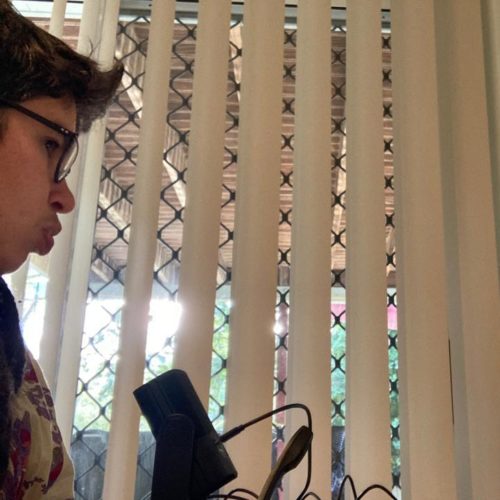What piece of audio has had the most profound effect on you – as a listener, as an audio maker or both?
Daniel Browning’s Latitudes, which came out in 2017. Latitudes is a sound work inspired by three UNESCO World Heritage sites: Lake Mungo in south-western New South Wales, the Kumano Kodo pilgrimage route in Japan and the Valcamonica rock art valley in northern Italy. I was completely blown away listening to this audio work. Huge respect to Daniel and what he does.
Where else do you find influence or inspiration for your work?
I read a lot of poetry, watch a lot of documentaries, and love curating playlists of songs I’m enjoying. I feel like this is all like my training to make podcasts my own way.
 Where do you work? And what tools help you most?
Where do you work? And what tools help you most?
I work in my bedroom. I’ve got a Rode USB microphone, which is an Australian brand and made in Australia, would recommend.
Where did the idea for your podcast come from?
The idea for Extraordinary Voices for Extraordinary Times (EV4ET) came at the beginning of the pandemic. I thought, where is the poetry? We need it now more than ever. The idea is: me and one of my favourite poets write a poem a month that responds to 2020, a year which has been so many things. In simple terms, the podcast is a poetry reading and a chat about how the poem was made.
Omar Sakr said yes to come on board to co-host, which was great because I’ve worked with Omar before and he’s able to bring his poems and voice to the project.
I love Poetry Foundation’s Poetry VS, an American poetry podcast, hosted by Danez Smith and Franny Choi. I’m not saying Omar and I are Danez and Franny but I definitely saw a gap in the Australian market for First Nations and POC poets to talk about poetry. Our work is the most potent work, and always has been.
What is your favourite part of making a podcast?
Hands down talking to the poets, on and off air. I had Eunice Andrada on the podcast first, who is just a dream. I felt so honoured to witness the very intimate journey of the poet creating a poem. Eunice and I talked while we were drafting the poems and it was great to see the process. We don’t often share this process with each other. A lot of the times we kind of just pretend that poems come out of mouths fully-formed.
What is the biggest challenge working on Extraordinary Voices for Extraordinary Times?
Responding to difficult, sad, intense times. For episode 3, I wrote a poem that’s charged with the themes of Black Lives Matter and Black Deaths in Custody. It really affected me – writing about this content – but it’s healing at the same time. During the recording, I started to choke up reading the poem. The beautiful Charmaine Papertalk Green held space for that grief. That’s what I love about working with your own mob and people who ‘get it’.
What’s the best (or worst) advice you’ve received about podcasting?
Smile while talking. You sound better. I use it every time.
As an audio maker, what have been your biggest lessons so far?
Just how much I don’t know about audio! I’m really just feeling my way through.
Do you think the work you make reflects your personality, if so, in which ways?
Umm yes … because I’m so intense as a person but also shy. I love listening, asking people questions, that part comes naturally.
If you could go out to dinner with any audio maker, who would it be and what would you talk about?
I’d love to go to dinner with adrienne maree brown (from How to Survive the End of the World) and talk transformative justice, visionary fiction and pleasure.
What are you listening to at the moment?
The New York Times’ 1619 ‘Episode 4: How the Bad Blood Started’ is a recent fave. It’s about how the medical system in America was founded in racism and how that affects Americans now.
What is your favourite Australian podcast and why?
I really like ABC’s All in the Mind with Lynne Malcolm because it has really good affirming advice from a range of sources on how to look after your mental health. I also like Queer Stories. Some of the stories are so funny and quirky I can’t help but laugh loudly in public spaces.
What – if anything – do you think distinguishes Australian audio? What would you like to hear more of?
I think what distinguishes Australian audio is a connection to Country, the local. We live in a nation of which the geographies and peoples are so diverse. I would love to see more urgent attention placed on Elders Stories in audio making as they are our Living Libraries. In our culture, we put them first.
What’s next?
I am co-hosting another podcast, which has just been launched by the Victorian Women’s Trust, in time for spring/summer 2020. It’s called Between the Leaves and Hermina Burns and I talk feminism and poetry.
You can listen to Ellen’s Extraordinary Voices for Extraordinary Times podcast here.